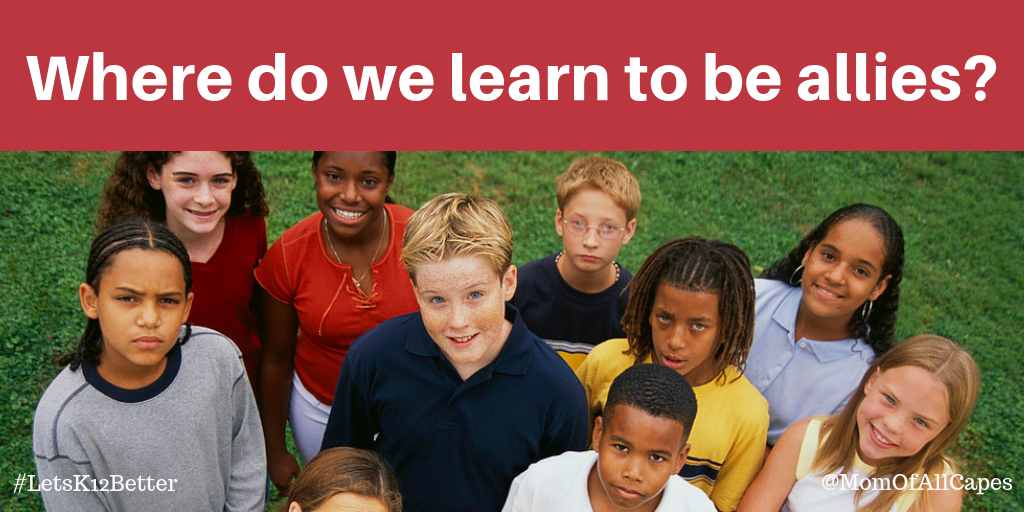|
We hear a lot about allyship. Allies are people (or groups) that might not experience a political, social, or economic pain point directly but can apply empathy in their dealings with a person or a community to help them improve a situation or state of being. Think of them as a friend in need or an advocate. These people are capable of taking their privilege and applying it to a situation in productive and uplifting manner. Anyone can be an ally because everyone is born with different privileges and depending on the situation, we can use that privilege to help someone in need. But how do we raise kids to understand their respective privileges? What strategies will ensure that kids use their privilege to help, not hurt, others? First and foremost, kids are smarter than we give them credit. They spend time applying the lessons and values learned at home and school as they navigate the world. Their naivety and their ability to relinquish constraints allows them, in many instances, to act with a strong moral compass and the genuine desire to help others. Children are more than ready, capable, and open to absorb the values and concepts required to create a caring and empathetic adult ally. Parents often unknowingly and through a variety of verbal and nonverbal cues teach their children about social norms, values, and beliefs. Teaching children about fairness, kindness, and sharing should not be taken lightly or ignored. These are actionable skills and values that can be practiced amongst family members and serve as the basic foundation to building empathy and allyship skills. School provides two critical spaces where children learn about social norms outside of their home- the classroom and the playground. A child’s learned norms are constantly challenged in school. This environment pushes them to see if these new ideas and values (from peers, school rules, etc) align or conflict with the home learned values they know to be “true”. We must allow kids the space to push their established values and norms. We must challenge children to think about social structures to continue to define what is “fair”, “right”, and “true”. Is everyone equal? Do some people have more say? Is that right? Recess is a social emotional development opportunity that many of us take for granted. Though I learned about society, order, and citizenship in the classroom environment; most of what I learned about people happened on the playground. The playground provides children a less structured opportunity to navigate their emotions and the emotions of others, leverage power and influence amongst peers, and communicate their needs. They create small and large groups based on games, common interests, and shared social interests and are in many ways the creators, judges, leaders, and observers of these co-created worlds. They learn how to join a group, how to deal with rejection, how to defend themselves and their ideas, and how to stand up for others. All of the social emotional learning experiences improve maturity, discernment, and courage. All of which are required for effective allyship. So how do we translate these learned experiences on the playground into real world skills that can be used for a lifetime? We don’t have to translate them at all. In fact, we just need to continue to push our children to connect the dots and create an internal check-in. The best way to help children cultivate the skill of allyship is through elevating your child’s social awareness of what aligns with your shared values when they engage with others. A simple exercise in “Is this fair? Can I help?”, is not only great for mindfulness and self awareness but for assessing when to be an ally for a friend or person in need. Allyship cannot be applied equally across every situation. When is it the right time to be an ally? Where is the best place to apply your voice? Here’s how I broke down allyship to my own kids:
Think back to your own experiences on the playground. Did someone speak up for you when you were picked on? Did you ever witness something unfair and did you help by speaking up or getting an adult? That is an ally! Our social experiences aren’t fragmented, they’re a string of lessons that teach us a lot about our place in society and our power to impact others. Parents can help bring it all together through thoughtful communication. Regularly check in with your child about what happened on the playground or in the classroom. Talk about how they felt, what they saw, the games they played. Don’t overreact and don’t over analyze play time, but help them talk through any weird situations that left them feeling upset, uncomfortable, or even brave. When parents and children work through those feelings together and think about strategies to be better next time, we equip our children with the tools and skills that will empower them to leverage their voice and privilege to help others. LISTEN UP:
Check out this podcast with Christine Koh and Asha Dornfest from the Edit You Life Show. I talk in depth about race, how to leverage your privilege, and how to be an ally. Listen here. Read more about all of the tips that inspired this podcast episode with this Parent Toolkit blog post How to Talk to Kids About Race and Racism Other Social Emotional Learning Experiences Through Play:
0 Comments
Your comment will be posted after it is approved.
Leave a Reply. |
I'm a former teacher and former college athlete, currently working to make life more equitable for all people. My mission is to get parents to partner with their child's teacher.
|

